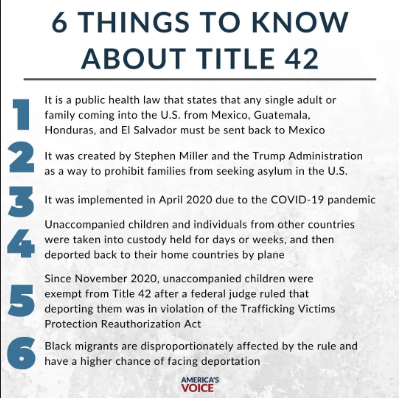
THE SCOTUS TITLE 42 STAY ORDER: WHAT IS IT REALLY ABOUT?
In ARIZONA, ET AL. v. ALEJANDRO MAYORKAS, SECRETARY OF HOMELAND SECURITY, SCOTUS voted 5-4 to grant an emergency request from 19 state attorneys general to stay the judgment of the D. C. Circuit Court arguing that the federal government would not defend the Title 42 orders as vigorously as they might. The D. C. Circuit denied the States’ motion to intervene to present such an argument.
The dissenting opinion written by Justice Gorsuch, who voted not to allow the stay and the intervention of the state attorneys general, joined by Justice Jackson summarizes the facts of the case as follows:
From March 2020 to April 2022, the Centers for Disease Control and Prevention responded to the COVID–19 pandemic by issuing a series of emergency decrees. Those decrees—often called “Title 42 orders”—severely restricted immigration to this country on the ground that it posed a “serious danger” of “introduc[ing]” a “communicable disease.” 58 Stat. 704, 42 U. S. C. §265. Fast forward to a few weeks ago. A district court held that the Title 42 orders were arbitrary and capricious, vacated them, and enjoined their operation. On appeal, Arizona and certain other States moved to intervene to challenge the district court’s ruling, arguing that the federal government would not defend the Title 42 orders as vigorously as they might. The D. C. Circuit denied the States’ motion. In response, the States have now come to this Court seeking two things. First, the States ask us to grant expedited review of the D. C. Circuit’s intervention ruling. Second, the States ask us to stay the district court’s judgment while we review the D. C. Circuit’s intervention ruling.
SCOTUS specifically limited the question it wants addressed to “Whether the State applicants may intervene to challenge the District Court’s summary judgment order.”
Whatever you have heard or read about the case of Title 42 being stayed the only question to be addressed by SCOTUS is whether state attorneys general are able to intervene in a federal case when they believe the issue or issues in which they have an interest will not be argued as vigorously as they would argue them.
SCOTUS made that perfectly clear when they stated in their opinion granting the stay that:
This stay precludes giving effect to the District Court order setting aside and vacating the Title 42 policy; the stay itself does not prevent the federal government from taking any action with respect to that policy. The Court’s review on certiorari is limited to the question of intervention.
It is strange but the Court clearly says that the stay allows the federal government to take any action it desires with respect to the policy developed under Title 42. So, the policy stays in effect and changes apparently can be made at the government’s will.
In the meantime, SCOTUS will not put a tremendous rush on the case because it stated:
The Clerk is directed to establish a briefing schedule that will allow the case to be argued in the February 2023 argument session.
The case is very important because of what the state attorneys general apparently think they have the ability to do – intervene in a federal case whenever they do not think their interests or the issues in which they have an interest will be sufficiently represented by the lawyers for the federal government. It will remain to be seen in the briefs presented to the Court what law or laws passed by Congress or provisions of the Constitution give them this authority. Normally, when an individual or organization not a party to the action wants to intervene in a case they file a petition to be allowed to file a brief as what is called an “amicus curiae”, or a friend of the court. The determination of the Court could have far-reaching ramifications. Just consider this: could any attorney general have the right to this remedy if a federal court somewhere in the country is taking a position contrary to the position that attorney general would like to have taken in the case?
The case will be followed closely in order to see what the Court does.
© 2022 Donald C Brockett #SCOTUS #Tyranny #concernedcitizen
#SCOTUS #Tyranny #concernedcitizen Facebook CAST-Citizens Against Supreme Court Tyranny
To comment on the newsletter, send an email to donbsbooks@gmail.com
Donald C. Brockett is a former Washington state attorney, who served 6 terms as Spokane County Prosecuting Attorney and is now retired after a total of 52 years between public and private practice.
During his time in the prosecutor’s office, he tried numerous cases in the District and Superior courts of Spokane County. For many years, he handled all appeals in the Washington State Supreme Court and later in that court and the newly created Court of Appeals for Division III. He has argued cases in the Ninth Circuit Court of Appeals, and the US Supreme Court.
Published with Permission of dcbrockett.substack.com